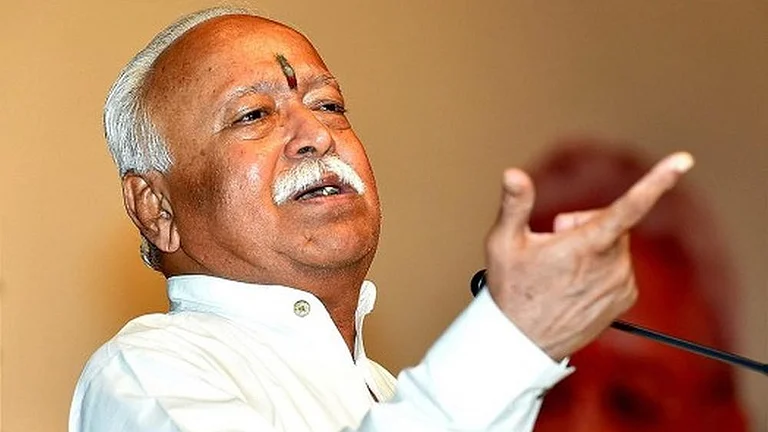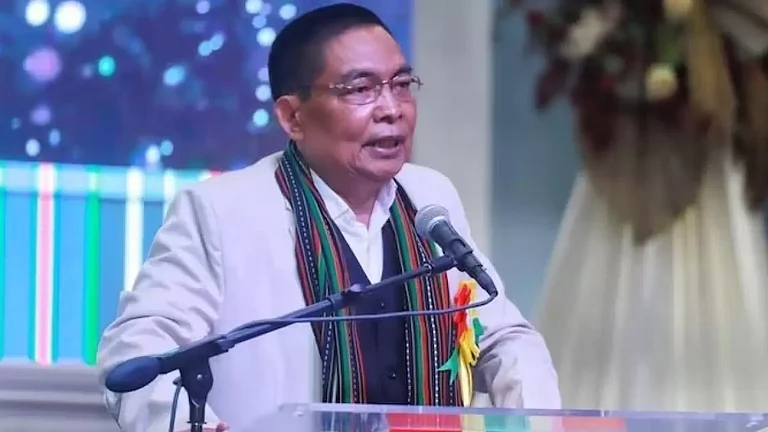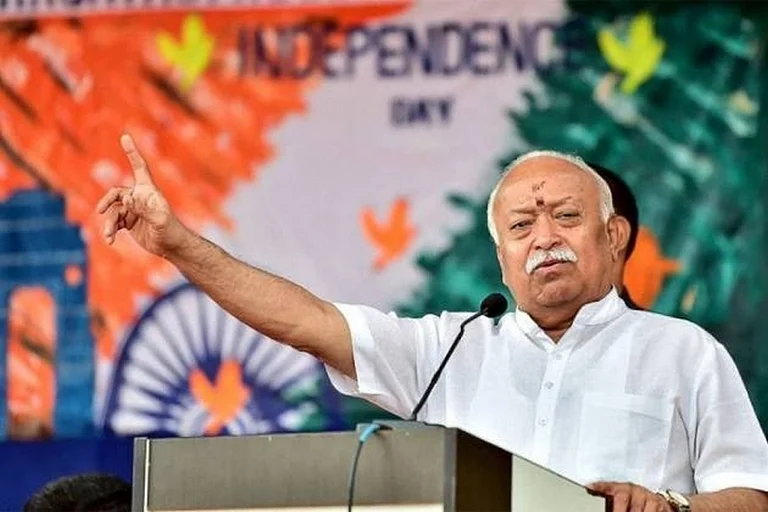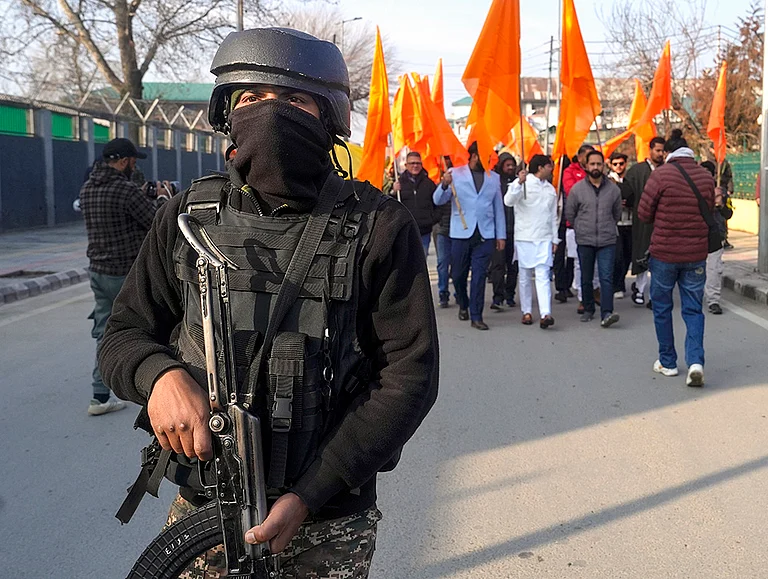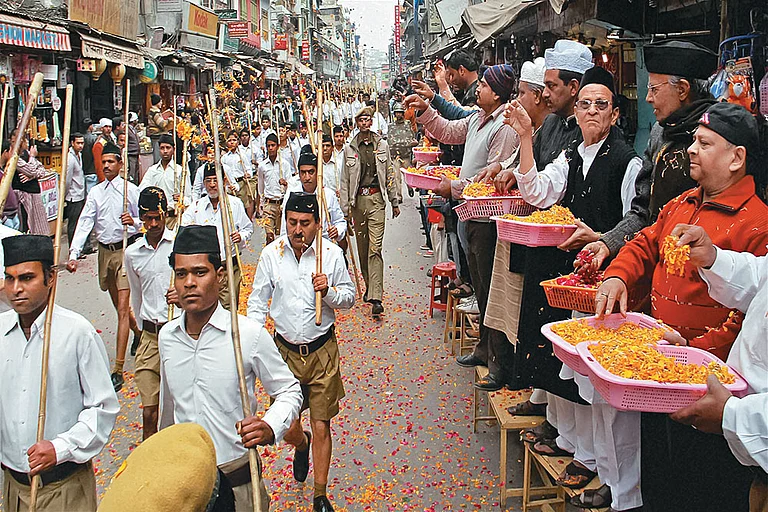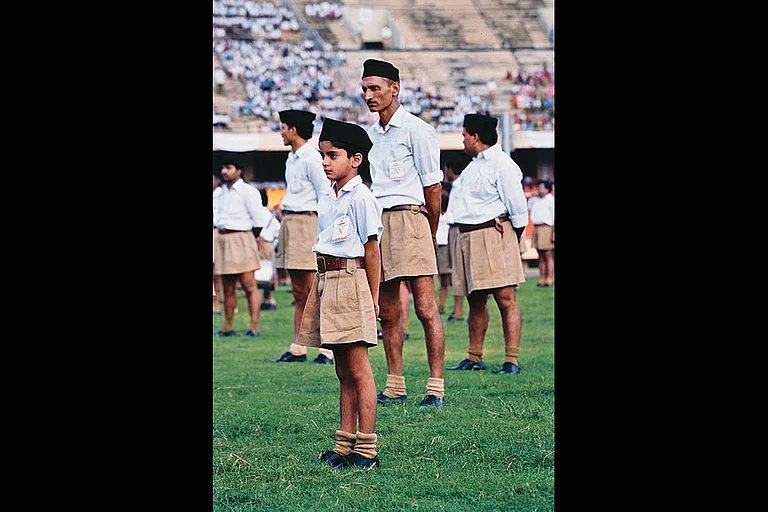
The Sangh's downward journey can perhaps be traced back to its March 1998 National Executive (Pratinidhi Sabha).
During the NDA government (1998-2004), the Sangh saw to it that the serious disagreements between the Prime Minister and various outfits like the VHP and the BMS did not degenerate into squabbles.
The author says, since 2014, the Sangh has given up any pretense of moral guardianship of the Narendra Modi regime.
Why should anyone be afraid of the Rashtriya Swayamsevak Sangh (RSS) just because it has completed 100 years of its existence? Minus the trappings of a very flabby militia, the organisation looks like any other outfit. Nothing special, nothing different about it.
If at 100, this Nagpur-based body of (mostly) men does not inspire the awe and respect it thinks it once did, it is because it no longer can lay a claim to being the custodian of our collective morals. In its own self-perception, the Sangh arrogates to itself the mantle of a sole overseer of patriotism, nationalism, and idealism in public life. It is a different matter that other than its own functionaries, no one else has ever conceded this claim.
This downward journey can perhaps be traced back to the March 1998 National Executive (Pratinidhi Sabha) of the RSS. Atal Bihari Vajpayee had just been sworn in as the Prime Minister of a coalition government, though he was still to win a vote of confidence—which he did on March 28. This was an expedient and transactional alliance of calculating political parties, but the RSS Chief Rajendra Singh (Rajju Bhaiya) chose to interpret the formation of the Vajpayee government as a rejection of the allegations and biases against ‘the pro-Hindutva forces’.
At the first hint of proximity to power, the moralistic and idealistic Sangh was ready with a convoluted logic to read popular approval and legitimacy into an experiment with opportunism. That experiment flopped within 13 months, but by now the RSS had trapped itself into the role of a godfather of the Bharatiya Janata Party (BJP) and its politics of compromise and convenience.
It is ironical that the more the Modi-Shah duo cut the RSS to size, the more it becomes the punching bag for the anti-BJP forces.
In the process, the RSS surrendered its role as the moral inquisitorial in the affairs of the BJP; rather, it assumed the task of pulling the BJP’s chestnuts out of fire whenever the Vajpayee-Advani arrangement ran into trouble on account of its own amoral politics. During the National Democratic Alliance (NDA) government (1998-2004), the Sangh saw to it that the occasional serious disagreements between the Prime Minister and various outfits like the Vishva Hindu Parishad and the Bharatiya Mazdoor Sangh did not degenerate into embarrassing disagreeableness. Acerbic voices like Ashok Singhal and Dattopant Thengadi were authoritatively told to hold their tongue.
And, since 2014, the Sangh has given up any pretense of moral guardianship of the Narendra Modi regime. It is content to spout on “Rashtra” and “rashtravad” while the crony capitalists are running away with the national wealth. Its cadres are innovating with new forms of rent-seeking; its senior leadership is pleased to play the middleman in the ancient and soiled art of patronage and promotions.
The RSS leadership no longer is able, nor is willing to discern shabby governance and rampant corruption in these days of presumed “Hindu primacy”. The fox cannot find its way back to the hole. Corporate India, with its corrupt inclinations and corrupting incentives, would see to it that the fox never finds its way. There is no redemption for Guruji’s boys.
If the Sangh has lost its old coherence and certainty, it is simply because it has become a vast—perhaps too vast—conglomerate, with numerous “cells” and “fronts” and “shakhas” combining to overwhelm it with unwieldiness. It can well be compared, say, to the Federation of Indian Chambers of Commerce & Industry—which will also be celebrating its centenary two years down the line—with the “headquarters” being reduced to striking a balance among conflicting voices and visions and vengeance.
All that remains of the Sangh at its centenary is some mystique, a bit of secrecy, elaborate rituals of command and obedience, and catechism so familiar and established in any cult or sect—say, like, the Swaminarayan order or the Rotary Club or the Radha Soami Satsang. The RSS is not the only NGO in the country trafficking in ideals and idealism and the Foreign Contribution (Regulation) Act (FCRA) benefits. Its sprawling organisation has become the sole raison d’être of its existence. But it insists on the uniqueness of its mission; it elevates its idealism to pure spiritualism; and, takes pride in the “discipline” and the “obedience” in its hierarchy.
Though during this last decade, the Modi-Shah duo has practically de-fanged the RSS, it is not entirely without its uses—not very consequential, but neither totally irrelevant.
The RSS, it seems, plays, rather well, the dubious role of keeping the liberals and the Left in a tizzy. In recent years, the RSS has found it amusingly self-satisfying to introduce faux debates, especially around the Constitution of India; and, then, enjoy the fun with the liberals and progressives working themselves into a lather.
Take, for example, the recent comments by Dattatreya Hosabale’s on the need to delete “socialism” and “secularism” from the Preamble to the Constitution. For months the country found itself embroiled in a heated debate, with the liberals being vociferous in denouncing the RSS’ “game plan”, and the television anchors outshouting anyone who were in favour of secularism. Then, when the recent Monsoon session of Parliament began, the Law Minister very quietly informed the Lok Sabha, that too in a written statement, that the government had no intention of making any changes in the Preamble. That was that.
It is ironical that the more the Modi-Shah duo cut the RSS to size, the more it becomes the punching bag for the anti-BJP forces. Rahul Gandhi is carving out a constituency for himself by being stridently “anti-RSS”. And, that suits Modi and his handlers, as long as the critics keep training their guns towards Nagpur, instead of the Raisina Hill.
The Modi-Shah team has also found another use for the RSS: the BJP uses the RSS to manipulate its own allies. The trick, by now, is familiar. The RSS is painted as the bad cop, while a Vajpayee or even a Modi is marketed as a “moderate” voice in the Hindutva stable. Even the middle classes and the business community fall for this good cop-bad cop routine. And, come the election time, the BJP leadership bargains hard with allies for seats, flaunting its “organisational heft” based on the RSS foot soldiers. If Shashi Kapoor told Amitabh Bachchan in Deewar “mere pass Ma hai,” the BJP crows “mere pass RSS hai.”
Arguably, the Nagpur brass can take satisfaction in its own “prosperity” in the Modi Decade: a new palatial building in Jhandewalan; “Z+” security for Mohan Bhagwat; the RSS boss could participate in the consecration of the Ram Mandir in Ayodhya; a designation of the “third most powerful person” in Naya Bharat; the gratifying experience of IPS and IAS officers, wanting this or that lucrative posting by paying obedience at Jhandewalan; and, one of its own becoming the Vice President of the Republic. The commissars have prized themselves rather low. A meagre dividend on a 100-year-old bank account; and, seductive charm of being extra-constitutional centre of power. In the process, it stands bereft of any transformative imagination.
There is no dearth of ‘historians’ willing to sing praises of the RSS and its “contribution” to a presumed national resurgence. Yet, it will be tall order even for an in-house saffron historian to speculate what Keshav Baliram Hedgewar or even Guru Golwalkar would make of the organisation and its current entanglement in Prime Minister Modi’s elaborate personality-cult. Perhaps, the founder’s regret.
(Views expressed are personal)
This story appeared as One Hundred Years of... Resistance in the print edition of Outlook magazine’s October 21 issue titled Who is an Indian?, which offers a bird's-eye view of the Rashtriya Swayamsevak Sangh (RSS), testimonies of exclusion and inclusion, organisational complexities, and regional challenges faced by the organisation.








